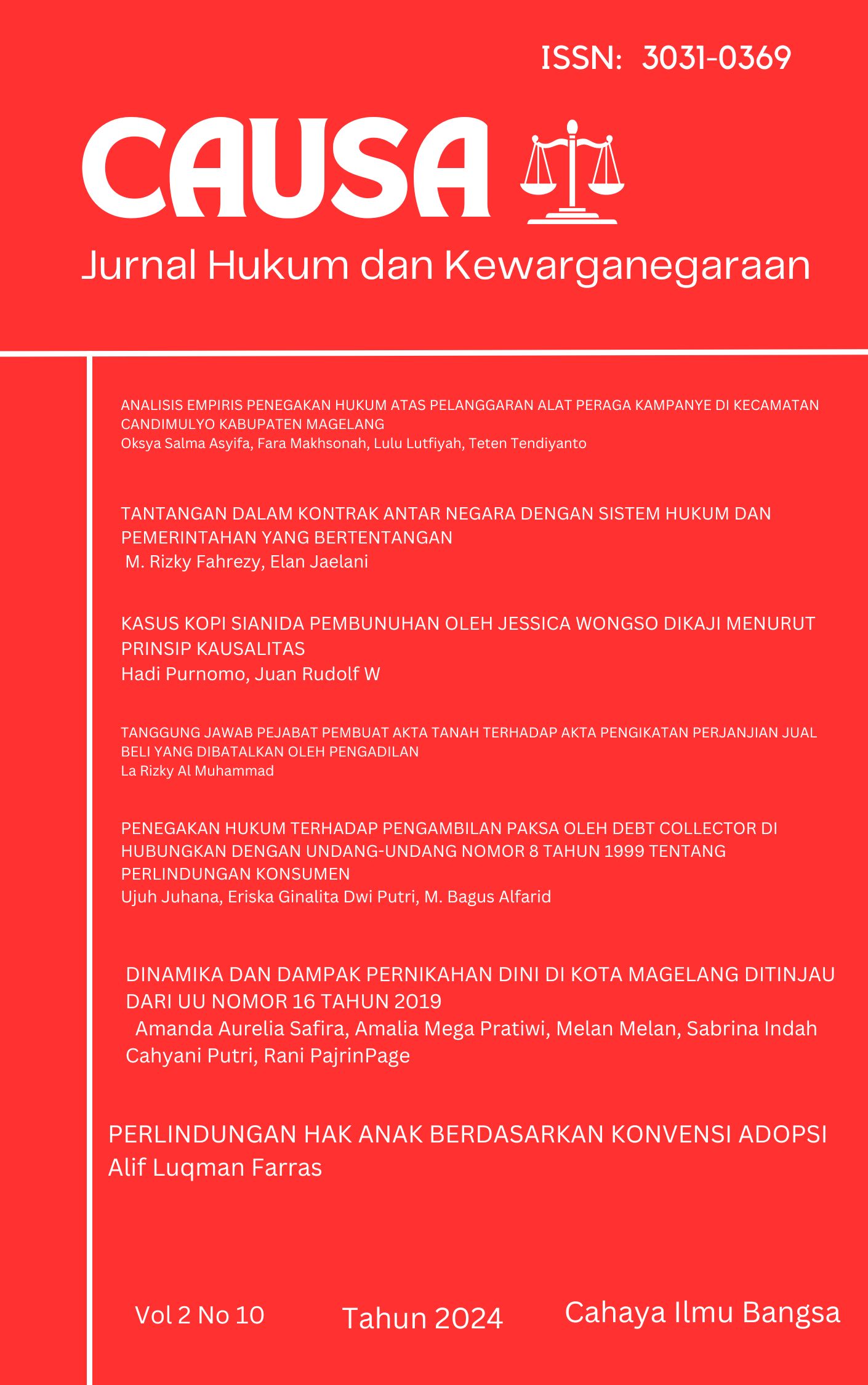ASPEK KRIMINOLOGI HUKUM DALAM KEJAHATAN DIGITAL REMAJA: STUDI UU ITE DAN FAKTOR SOSIAL
- Authors
-
-
Putri Ramadhani Rangkuty
Prodi Hukum Pidana Islam, Fakultas Syariah dan Hukum, Universitas Islam Negeri Sumatera UtaraAuthor -
Dinda Ayu Arini Chaniago
Prodi Hukum Pidana Islam, Fakultas Syariah dan Hukum, Universitas Islam Negeri Sumatera UtaraAuthor -
Fitria Muchtar Siregar
Prodi Hukum Pidana Islam, Fakultas Syariah dan Hukum, Universitas Islam Negeri Sumatera UtaraAuthor -
Irham Mahromy Munthe
Prodi Hukum Pidana Islam, Fakultas Syariah dan Hukum, Universitas Islam Negeri Sumatera UtaraAuthor -
Irpan Mauliandi Damanik
Prodi Hukum Pidana Islam, Fakultas Syariah dan Hukum, Universitas Islam Negeri Sumatera UtaraAuthor -
Nia Amelia Suhada Dalimunthe
Prodi Hukum Pidana Islam, Fakultas Syariah dan Hukum, Universitas Islam Negeri Sumatera UtaraAuthor -
Rahman Al-Fauzi Siregar
Prodi Hukum Pidana Islam, Fakultas Syariah dan Hukum, Universitas Islam Negeri Sumatera UtaraAuthor
-
- Keywords:
- Legal Criminology, Digital Crime, Adolescents, Electronic Information and Transactions Law (ITE Law), Social Factors
- Abstract
-
The advancement of digital technology has opened new avenues for adolescents to interact, but it has also given rise to various forms of digital crime involving them as perpetrators. This journal discusses the legal criminology aspects in the context of digital crimes committed by adolescents, focusing on the analysis of the Law on Electronic Information and Transactions (UU ITE) and the social factors underlying their involvement. This study employs a qualitative approach using literature review and normative analysis of the UU ITE, accompanied by a criminological examination of social phenomena that influence adolescent digital behavior. The findings reveal that weak digital literacy, social environmental influences, and lack of supervision from families and educational institutions are dominant factors driving adolescents into digital crimes such as defamation, distribution of illegal content, and online fraud. The UU ITE, as a legal instrument, is considered to remain repressive and suboptimal in its preventive and educational aspects. Therefore, an integrative approach combining legal policy, education, and criminological understanding is necessary to comprehensively address adolescent digital crime.
- Downloads
- Published
- 2025-06-11
- Section
- Articles
How to Cite
Most read articles by the same author(s)
- Ikhsan Sahriyan, Muhammad Fazli Pratama, Rahman Al-Fauzi Siregar, Ahmad Yasin Dongoran, Nurhafizah Husna, KEBIJAKAN PERLINDUNGAN HUKUM BAGI PEKERJA RUMAH TANGGA MELALUI KEPASTIAN HUKUM , Causa: Jurnal Hukum dan Kewarganegaraan: Vol. 13 No. 11 (2025): Causa: Jurnal Hukum dan Kewarganegaraan
- Putri Ramadhani Rangkuty, Arsyad Rizky Pratama Siregar, TRANSFORMASI DELIK PENCEMARAN NAMA BAIK DALAM ERA DIGITAL: RELEVANSI UU ITE PASCA PERUBAHAN KEDUA , Causa: Jurnal Hukum dan Kewarganegaraan: Vol. 14 No. 5 (2025): Causa: Jurnal Hukum dan Kewarganegaraan
Similar Articles
- Najwa Melfia Maharani, Emilia Susanti, Deni Achmad, Firganefi, POLITIK HUKUM PIDANA DALAM PENANGGULANGAN TINDAK PIDANA PEMERASAN BERMUATAN SEKSUAL (SEXTORTION) MELALUI MEDIA SOSIAL , Causa: Jurnal Hukum dan Kewarganegaraan: Vol. 15 No. 8 (2025): Causa: Jurnal Hukum dan Kewarganegaraan
- Frencky Maralop, Henny Nuraeny, Sudiman Sihotang, FUNGSIONALISASI BARANG BUKTI DIGITAL YANG DIPEROLEH MELALUI DIGITAL FORENSIK DALAM PERSPEKTIF PEMBUKTIAN PERKARA PIDANA KEJAHATAN BISNIS , Causa: Jurnal Hukum dan Kewarganegaraan: Vol. 15 No. 2 (2025): Causa: Jurnal Hukum dan Kewarganegaraan
- Alwi Suhaya, Qeysha Ayle Viorella, Salsabila, URGENSI UU PERLINDUNGAN DATA PRIBADI: TANGGUNG JAWAB HUKUM KEBOCORAN DATA PEDULILINDUNGI , Causa: Jurnal Hukum dan Kewarganegaraan: Vol. 14 No. 9 (2025): Causa: Jurnal Hukum dan Kewarganegaraan
- Maria Nursiana Lalian, Elsiana Boe Dao, RATIO DECI DENDI TERHADAP PELAKU TINDAK PIDANA PEMERASAN DAN/ATAU PENGANCAMAN OLEH PENAGIH PINJAMAN ONLINE ILEGAL MELALUI WHATSAPP DI TINJAU BERDASARKAN UNDANG-UNDANG INFORMASI DAN TRANSAKSI ELEKTRONIK NOMOR 19 TAHUN 2016 (Analisis Putusan Nomor 438/Pid.Sus/2020/PN Jkt.Utr) , Causa: Jurnal Hukum dan Kewarganegaraan: Vol. 14 No. 11 (2025): Causa: Jurnal Hukum dan Kewarganegaraan
- Putri Sofiani Danial, PRAKTIK PENAGIHAN ABUSIF OLEH PINJAMAN ONLINE ILEGAL: KETIMPANGAN AKSES KEADILAN DAN PERLINDUNGAN KONSUMEN DI INDONESIA , Causa: Jurnal Hukum dan Kewarganegaraan: Vol. 13 No. 4 (2025): Causa: Jurnal Hukum dan Kewarganegaraan
- Putri Sofiani Danial, Trubus Rahardiansyah, PRAKTIK PENAGIHAN ABUSIF OLEH PINJAMAN ONLINE ILEGAL: KETIMPANGAN AKSES KEADILAN DAN PERLINDUNGAN KONSUMEN DI INDONESIA , Causa: Jurnal Hukum dan Kewarganegaraan: Vol. 15 No. 1 (2025): Causa: Jurnal Hukum dan Kewarganegaraan
- Justika Hairani, Ali Masyhar, Cahya Wulandari, Anis Widyawati, PERTANGGUNGJAWABAN PIDANA INDIVIDU TERHADAP TINDAK PIDANA DOXXING ANTARNEGARA PERSPEKTIF HUKUM PIDANA INTERNASIONAL , Causa: Jurnal Hukum dan Kewarganegaraan: Vol. 14 No. 1 (2025): Causa: Jurnal Hukum dan Kewarganegaraan
- Amalia Fakhrana Suhandy, Dhiya Ulhaq, Dayandra Suspita Putri, Eva Savariah, ikhwan Aulia Fatahillah, HAK CIPTA DI LAYAR GELAP: TINJAUAN HUKUM ATAS AKSES ILEGAL FILM MELALUI SITUS STREAMING BAJAKAN , Causa: Jurnal Hukum dan Kewarganegaraan: Vol. 14 No. 7 (2025): Causa: Jurnal Hukum dan Kewarganegaraan
- Laurensius Hotma Martogi Haloho, Firganefi, Dona Raisa Monica, ANALISIS KRIMINOLOGI TERHADAP TAWURAN ANTAR PELAJAR YANG MENGAKIBATKAN KEMATIAN (STUDI KASUS DI POLDA LAMPUNG) , Causa: Jurnal Hukum dan Kewarganegaraan: Vol. 13 No. 3 (2025): Causa: Jurnal Hukum dan Kewarganegaraan
- Johan Amanda Maliku, Taun Taun, ANTARA HOAKS DAN UJARAN KEBENCIAN : KESENJANGAN PENEGAKAN HUKUM PIDANA DI ERA DISINFORMASI DIGITAL , Causa: Jurnal Hukum dan Kewarganegaraan: Vol. 12 No. 12 (2025): Causa: Jurnal Hukum dan Kewarganegaraan
You may also start an advanced similarity search for this article.

